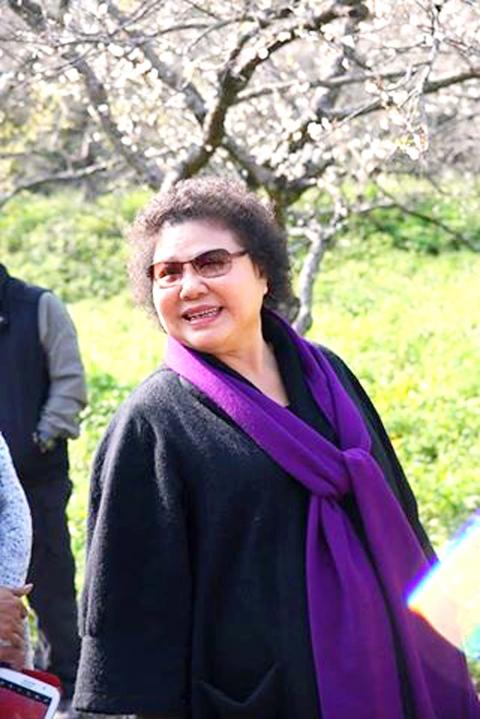The public sees Kaohsiung Mayor Chen Chu (陳菊) as the best performer among 12 of the nation’s political leaders, while President Ma Ying-jeou (馬英九) is ranked as the worst, according to an opinion poll released yesterday.
A Taiwan Mood Barometer Survey conducted by Taiwan Indicators Survey Research (TISR) this week was aimed at determining “favorability” of the politicians — defined as the public’s general impressions of the person’s personal characteristics and how “likable” (好感度) they are.
The Democratic Progressive Party’s (DPP) Chen scored a favorability rating of 72.5 percent, while Ma, a Chinese Nationalist Party (KMT) member, earned a 65.9 percent dissatisfaction rating.

Photo taken from Facebook
Independent Taipei Mayor Ko Wen-je (柯文哲) came in second behind Chen in terms of favorability with 71 percent, followed by DPP Tainan Mayor William Lai (賴清德) with 65.3 percent, KMT Legislative Speaker Wang Jin-pyng (王金平) with 63.6 percent, New Taipei City Mayor and KMT Chairman Eric Chu (朱立倫) with 62.1 percent and DPP Chairperson Tsai Ing-wen (蔡英文) with 60.9 percent.
Scoring less well were new Taichung Mayor Lin Chia-lung (林佳龍) — a former DPP legislator — who received 53.6 percent, former Taipei mayor Hau Lung-bin (郝龍斌) of the KMT with 35.2 percent and Taoyuan Mayor Cheng Wen-tsan (鄭文燦) of the DPP — a former minister of the now-defunct Government Information Office — with 34.4 percent.
Three top KMT politicians rounded out the bottom of the favorability rankings: Premier Mao Chi-kuo (毛治國) with 28.1 percent, Vice President Wu Den-yih (吳敦義) with 22.2 percent and Ma with just 21.8 percent.
Far fewer respondents expressed dissatisfaction with Chen (13.4 percent) or Ko (15.4 percent) compared with Ma and his 65.9 percent rating.
The survey of Taiwanese aged 20 year-old or above was conducted from Monday to Wednesday using computer-
assisted telephone interviewing and random-digit-dial systems. A total of 1,006 valid surveys were collected.
The survey has a margin of error of 3.1 percentage points.

Tropical Storm Gaemi strengthened into a typhoon at 2pm yesterday, and could make landfall in Yilan County tomorrow, the Central Weather Administration (CWA) said yesterday. The agency was scheduled to issue a sea warning at 11:30pm yesterday, and could issue a land warning later today. Gaemi was moving north-northwest at 4kph, carrying maximum sustained winds near its center of up to 118.8kph and gusts of 154.8kph. The circumference is forecast to reach eastern Taiwan tomorrow morning, with the center making landfall in Yilan County later that night before departing from the north coast, CWA weather forecaster Kuan Shin-ping (官欣平) said yesterday. Uncertainty remains and

SEA WARNING LIKELY: The storm, named Gaemi, could become a moderate typhoon on Wednesday or Thursday, with the Taipei City Government preparing for flooding A tropical depression east of the Philippines developed into a tropical storm named Gaemi at 2pm yesterday, and was moving toward eastern Taiwan, the Central Weather Administration (CWA) said. Gaemi could begin to affect Taiwan proper on Tuesday, lasting until Friday, and could develop into a moderate typhoon on Wednesday or Thursday, it said. A sea warning for Gaemi could be issued as early as Tuesday morning, it added. Gaemi, the third tropical storm in the Pacific Ocean this typhoon season, is projected to begin moving northwest today, and be closest to Taiwan on Wednesday or Thursday, the agency said. Today, there would likely

DISRUPTIONS: The high-speed rail is to operate as normal, while several airlines either canceled flights or announced early departures or late arrivals Schools and offices in 15 cities and counties are to be closed today due to Typhoon Gaemi, local governments announced last night. The 15 are: Taipei, New Taipei City, Taoyuan, Tainan, Keelung, Hsinchu and Kaohsiung, as well as Yilan, Hualien, Hsinchu, Miaoli, Chiayi, Pingtung, Penghu and Lienchiang counties. People should brace for torrential rainfall brought by the storm, with its center forecast to make landfall on the east coast between tonight and tomorrow morning, the Central Weather Administration (CWA) said. The agency issued a sea warning for the typhoon at 11:30pm on Monday, followed by a land warning at 11:30am yesterday. As of

CASUALTY: A 70-year-old woman was killed by a falling tree in Kaohsiung as the premier warned all government agencies to remain on high alert for the next 24 hours Schools and offices nationwide are to be closed for a second day today as Typhoon Gaemi crosses over the nation, bringing torrential rain and whipping winds. Gaemi was forecast to make landfall late last night. From Tuesday night, its outer band brought substantial rainfall and strong winds to the nation. As of 6:15pm last night, the typhoon’s center was 20km southeast of Hualien County, Central Weather Administration (CWA) data showed. It was moving at 19kph and had a radius of 250km. As of 3pm yesterday, one woman had died, while 58 people were injured, the Central Emergency Operation Center said. The 70-year-old